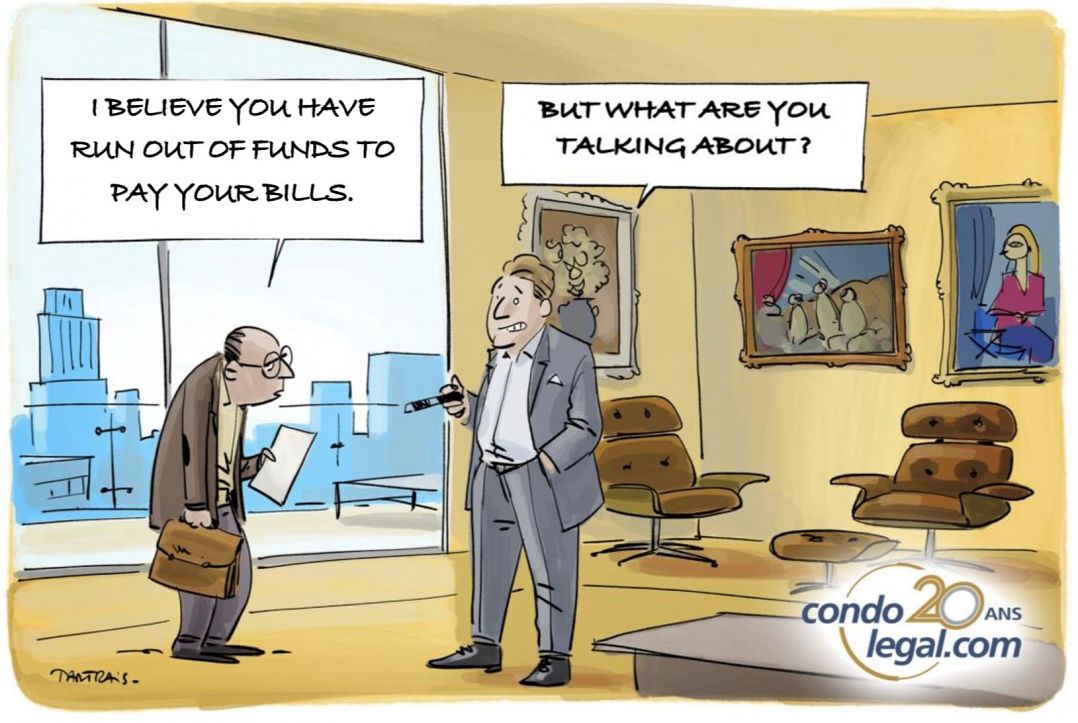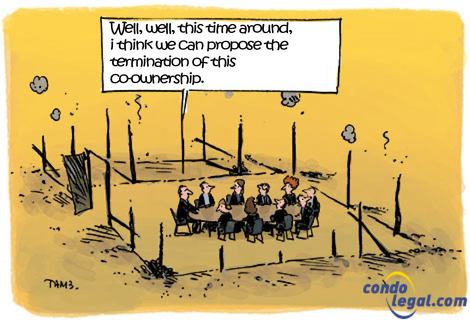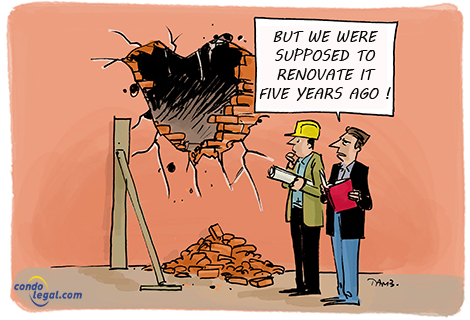 The presence of a board of directors is mandatory in a co-ownership. It is the executive body of the syndicate and its legal representative. As for its members, they act as mandataries of the syndicate. Because of the phenomenon of co-ownership in difficulty or dysfunctional, the legislator, through Bill 16, has put in place judicial mechanisms to overcome these difficulties. Article 1086.4 was thus introduced into the Civil Code of Quebec. This addition allows the court to replace the board of directors with a provisional administrator, if circumstances warrant, and to determine the terms and conditions of its administration (e.g., term of office).
The presence of a board of directors is mandatory in a co-ownership. It is the executive body of the syndicate and its legal representative. As for its members, they act as mandataries of the syndicate. Because of the phenomenon of co-ownership in difficulty or dysfunctional, the legislator, through Bill 16, has put in place judicial mechanisms to overcome these difficulties. Article 1086.4 was thus introduced into the Civil Code of Quebec. This addition allows the court to replace the board of directors with a provisional administrator, if circumstances warrant, and to determine the terms and conditions of its administration (e.g., term of office).
Appointment
If the court considers that the circumstances justify it, for example when the operation of the co-ownership is compromised (due in particular to a financial crisis), it may appoint a provisional administrator. The latter will have a very distinct role from the outgoing board of directors, because it replaces the directors, who have been divested.
The provisional administrator is thus intended to temporarily ensure the management of the co-ownership instead of the board of directors. The court may also determine the terms and conditions of its administration. If the situation of the co-ownership is so bad that the adjustment of the accounts is difficult, the provisional administrator may enlist the intervention of other actors, for example a certified professional accountant.
Specific cases
The phenomenon of Quebec co-ownerships in difficulty is relatively recent and limited in terms of number. They take various forms. These may be small buildings where the board of directors is dysfunctional or non-existent. In other situations, we are talking about large developments built in the 1980s and 1990s, where syndicates are unable to take out insurance in accordance with the Law, due to the chronic maintenance deficit. The first signs of a co-ownership in difficulty are the following: multiplication of unpaid, constant increase in common charges, inability to insure all or part of the co-ownership, suppliers paid systematically late and degradation of common portions.
Persons who may be designated as provisional administrator
In addition to the eligibility conditions provided for by law, no aptitude, competence or other special conditions are imposed to exercise the function of provisional administrator. That office should be granted only to qualified persons. This is the case for:
Duties and obligations of the provisional administrator
The provisional administrator is entrusted with the same powers as any other director of a syndicate of co-owners. He is required to administer and manage the co-ownership. As such, it must, at a minimum:
In principle, the provisional administrator personally carries out the task entrusted to him, but may be assisted if necessary.
Collect common expenses (condo fees)
Collecting the common expenses of all co-owners is part of the primary mission of the provisional administrator. When the co-ownership is in "financial difficulty": unpaid common charges accumulate, the building risks deteriorating because the syndicate no longer has the necessary financial resources. Not to mention the domino effect: a co-owner in difficulty places the debt of his unpaid on the other co-owners, who, in turn, can collapse under the charges and jeopardize the entire co-ownership.
Works
The recovery of the co-ownership may require the execution of work. In this case, the judge may authorize the provisional administrator to undertake work contributing to the reorganization of the co-ownership.
Statement of Accounts
Several accounting operations must be carried out, recording of financial transactions, bank reconciliations, preparation of financial statements and particularly for the individual accounts of the co-owners:
At the end of his term, the provisional administrator must account for his administration through the presentation of financial statements. These should be presented by an accountant who comments on the financial situation of the syndicate. Its report will identify any potential irregularities.
Rendering of accounts by the provisional administrator is important because it allows co-owners to:
 WHAT YOU SHOULD KNOW! The appointment of a provisional administrator is symptomatic of a failing financial health of the co-ownership, even if as it stands its situation is not irreparably compromised.
WHAT YOU SHOULD KNOW! The appointment of a provisional administrator is symptomatic of a failing financial health of the co-ownership, even if as it stands its situation is not irreparably compromised.
 WHAT TO KEEP IN MIND : When co-owners are unable to meet the payment of their expenses, when work can no longer be undertaken due to lack of funds and when the building can no longer be properly maintained, the co-ownership becomes in difficulty.
WHAT TO KEEP IN MIND : When co-owners are unable to meet the payment of their expenses, when work can no longer be undertaken due to lack of funds and when the building can no longer be properly maintained, the co-ownership becomes in difficulty.
 WARNING! The divided co-ownership of an immovable is not necessarily destined to last forever. The termination of the co-ownership, and by the same token the dissolution and liquidation of the syndicate, is a question that will eventually arise for some co-ownerships. Furthermore, its termination is governed by articles 1108 and 1109 of the Civil Code of Québec, which refer to the rules applicable to legal persons concerning their liquidation.
WARNING! The divided co-ownership of an immovable is not necessarily destined to last forever. The termination of the co-ownership, and by the same token the dissolution and liquidation of the syndicate, is a question that will eventually arise for some co-ownerships. Furthermore, its termination is governed by articles 1108 and 1109 of the Civil Code of Québec, which refer to the rules applicable to legal persons concerning their liquidation.


